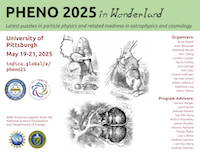Speaker
Description
Stellar binaries have historically provided a rich target in the search for exotic compact objects such as primordial black holes (PBHs) or MACHOs. In a three-body interaction involving a PBH and a binary star system, the binary can either lose or gain a significant amount of energy from the PBH, leading to a change in its orbital period. A standard lore has been that if the perturber velocity is large compared to the orbital velocity of the binary components, as is typical for PBHs, the perturbation only produces a small shift in the binary energy, and hence is undetectable. We point out that the standard lore is only true if the number of perturber interactions with the binary is statistically large. If the number of perturber interactions is small, the net effect is more akin to shot noise. We apply our formalism to PBHs producing perturbations in the binding energy of binary pulsar systems, which provides the most optimistic scenario to capture shot noise, given the extraordinary precision of binary pulsar timing.

